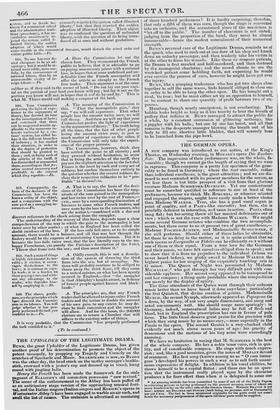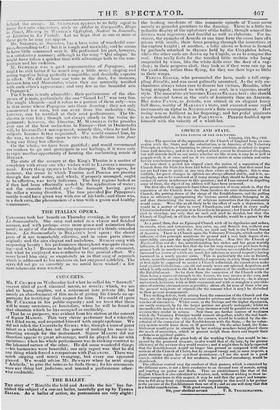THE GERMAN OPERA.
A NEW company was introduced to our notice, at the King's Theatre, on Wednesday evening, in MOZART'S opera Die Zouber- .11iite. The impression of their performance was, on the whole, fa- vourable; though we cannot go the length of saying that we were in raptures. This company is a pretty fair specimen of the gene- rality to be found in Germany; where the tout ensemble, rather than individual excellence, is the great attraction ; and we are dis- posed to rest contented with its present members for the season, as we fear there is but little prospect of a visit from that glorious creature Madame SC FIRCE DE R-DE VRI ENT. Yet our contentment must be somewhat qualified in reference to one at least of the performers, because we think Mr. ROECKEL, or whoever selected and engaged the singers, might have easily made a better choice than Madame WALKER. True, she has a good vocal organ in point of quality, and a PASTA-like ensemble; but then, she is painfully deficient in intonation, and tame in action. PASTA often sung fiat; but her acting threw all her musical deficiencies out of view ; which is not the case with Madame WALKER. We might name several German artistes who combine the two accomplish- ments, but there occur to us at present two of great excellence,— Madame FISCHER-ACHTEN, and Mademoiselle SCHECHNER, if she still performs. Should either of these ladies be obtainable, let there be no delay in the matter, as it is quite evident that no such operas as Earyanthe or Fidelio can be efficiently cast without one of them or their equal. From a true love for the Germans and their music, we have felt ourselves obliged thus to speak ; and to show that it is from no prejudice to the individual (whom we never heard before), we gladly award to Madame WALKER the highest praise for her singing of the exquisitely touching aria in G minor. The Queen of Night was personated by Madame MICHALESI ;* who got through her very difficult part with con- siderable applause. Her second song appeared to be transposed to suit her compass ; a thing quite justifiable where the compositions are merely for the display of agility.
The three attendants of the Queen went through their arduous music better than we have heard it done anywhere; particularly the first Quintett, that divine creation of genius. Mademoiselle MUNCH, the second Nymph, afterwards appeared as Papagena (in a dress, by the way, of not very ample dimensions), and sung and acted uncommonly well. She should rouge more sparingly : in Germany, indeed, supernatural ladies may be full of flesh and blood, but in England the prescription has run in favour of pale faces. The little Genii deserve great praise for the precision with which they sung music by no means easy,—more especially in the Finale to the opera. The second Genius is a rosy-checked child evidently not' much above seven years of age: his gravity of demeanour and the motions of his tiny arms were exceedingly amusing.
We have no hesitation in saying that M. SCHMEZER is the best of the whole company. He has a noble tenor voice, rich in qua- lity, and of considerable compass. He sings with much expres- sion; and, like a good musician, gives .the notes of MOZART devoid of ornament. His first song (known among us as " 0 cam immas gine ") developed his powers in such a way as to call forth unani- mous expressions of delight. In addition to his vocal abilities, he shows himself to be a capital flutist : and there can be no ques- tion that the instrument really played upon by the character • produces a fir finer effect than when it is delegated to some one • An amusing mistake has been committed by some if not all of the Daily Papers, in criticizing persons as having performed on the present occasion. some of whom are many hundred miles on the other side of the German Ocean. Madame BRAUEN is not here ; neither are DELCHER and DURING (both being, we presume, still at Darmstadt), nor yet Urrz. The fact is. those mentioned originally for the parts could nut come: hence the necessary postponement of the opera till these parts could be supplied, behind the scenes. M. Sett:masa api ears to us fully equal to many first-rate characters, such as ridular in Euryanthe, Hugo ia Purest, Murney iu W INTER'S Opfeifest, Nudori in Jessonda, or Licinius its La Vestak. Let us hope that in one or more of these parts he may yet appear. Mr. SIEBERT, as Surastro, has a bass voice of wonderful com- pass,deseending to C : but it is rough and unwieldy, and he seems to have little command over it. He performed his part, however, in a satisfactory manner; although in the song " Qui sdegno" he might have taken a quicker time with advantage both to the com- position and his auditors. M. GUNTIIER was a goad representative of Papageno, and might be still better if he would sing a little more ; singing and acting together being perfectly compatible, and decidedly superior in eilixt. We did not hear one tone in the duet, for instance, between him and Monostatos, where they are mutually terrified with each other's appearance; and very few in the beautiful aria " Papager a." The Chorus is truly admirable : their performance of the cho- russes of pi iests, particularly the one" Grand Isir was very fine. The single Llemish—and it refers to a portion of them only—was in that scene where Papageno sets them dancing ; they not only commenced too soon, but ran away from the orchestra : this, however, can he rectified at their next performance. The Or- chestra is very fair ; though not always steady in the violin de- partment : however, the Director, M. MANGOLD (who presides over one of the best orchestras in Europe—that at Darmstadt) will, by his excelleht management, remedy this, when he and his subjects become better acquainted. We would counsel him, by the way, to restore the opera to two acts; its division into four king any thing but effective.
On the whole, we have been gratified ; and would recommend our readers to go and participate in our feelings, it' it were only to enjoy another opportunity of hearing the enchanting music of MOZART.
The state of the scenery at the King's Theatre is a matter of complaint with every one who wishes well to LAPORTE'S manage- ment. Every thing appears to be in disrepair. In this opera, for instance, the scene in which Tamino aid Pauline are passing through fire and water, and which, if properly managed, ought to be effective, was truly ludicrous. The fiery regions looked as if they had been effectually cooled by the application of water; and the cascade tumbled up !—the turnspit having given the roller a wrong direction. The tree provided for Papageno's suicide would have given way with one of his birds ; and there was, in a dark cave, the phenomenon of a tree with a green and healthy countenance.





















 Previous page
Previous page